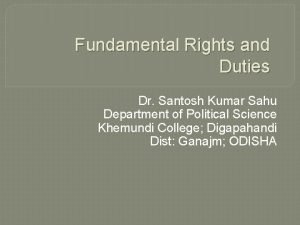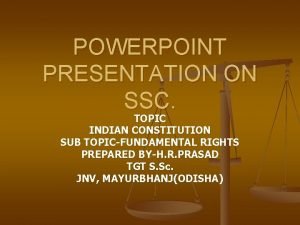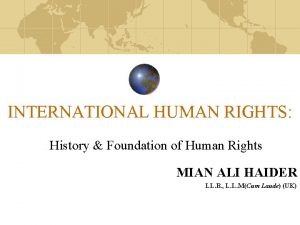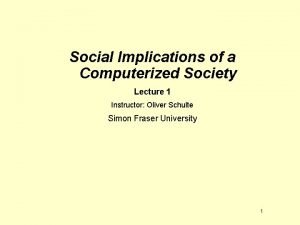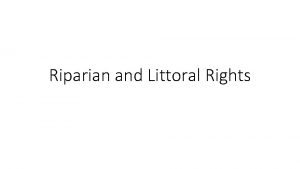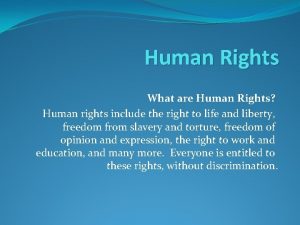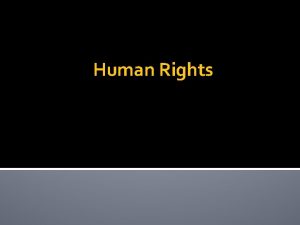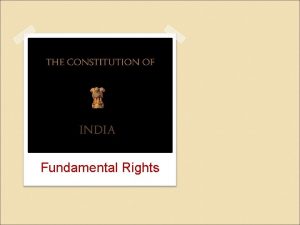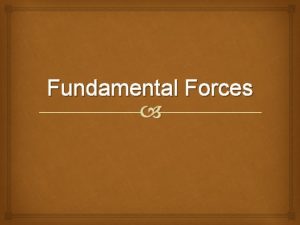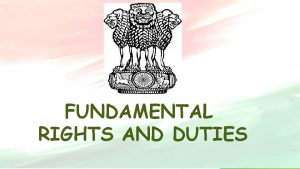WHAT ARE HUMAN RIGHTS HUMAN RIGHTS The fundamental










- Slides: 10

WHAT ARE HUMAN RIGHTS? ?

HUMAN RIGHTS!!!! The fundamental rights that humans have by the fact of being human, and that are neither created nor can be abrogated by any government. Supported by several international convensions and treatries (such as the United nation’s Universal declaration of Human rights in 1948), these include cultural, economic, and political rights, such as right to life, liberty, education and equality before law, and right of association, belief, free speech, information, religion, movement, and nationality. Promulgation of these rights is not binding on any country but they serve as a standard of concern for people and from the basis of many modern national constitutions Although they were defined first by the Scottish philosopher John Locke (16321704) as absolute moral claimist or entitlements to life, liberty, and proberty the best-known expression of human rights is in the Virginia Declaration of Rights in 1776 which proclaims that "All men are by nature equally free and indipendent and have certain inherent rights, of which, when they enter a state of society, they cannot, by any compact, deprive or diverst their posterity. «Called also fundamental rights. See also civil rights and natural rights

• Human rights are held by all persons equally, universally, and forever. • Human rights are inalienable: you cannot lose these rights any more than you can cease being a human being. • Human rights are indivisible: you cannot be denied a right because it is "less important" or "nonessential. " Human rights are interdependent: all human rights are part of a complementary framework. For example, your ability to participate in your government is directly affected by your right to express yourself, to get an education, and even to obtain the necessities of life. • Another definition for human rights is those basic standards without which people cannot live in dignity. To violate someone’s human rights is to treat that person as though she or he were not a human being. To advocate human rights is to demand that the human dignity of all people be respected. • In claiming these human rights, everyone also accepts the responsibility not to infringe on the rights of others and to support those whose rights are abused or denied.

ARTICLES OF HUMAN RIGHTS • Article 1. All human beings are born free and equal in dignity and rights. They are endowed with reason and conscience and should act towards one another in a spirit of brotherhood. • Article 2. Everyone is entitled to all the rights and freedoms set forth in this Declaration, without distinction of any kind, such as race, color, sex, language, religion, political or other opinion, national or social origin , wealth, birth or other status. No distinction shall be made on the basis of the political, jurisdictional or international status of the country or territory to which a person belongs, whether it be independent, trust, non submitted or self-governing or under any other limitation of sovereignty. • Article 3. Everyone has the right to life, liberty and security of person

• Article 4. No one shall be held in slavery or servitude; slavery and the slave trade shall be prohibited in all their forms. • Article 5. No one shall be subjected to torture or to treatment or to cruel, inhuman or degrading. • Article 6. Everyone has the right, in every place, to the recognition of his legal status. • Article 7. All are equal before the law and are entitled without any discrimination to equal protection of the law. All are entitled to equal protection against any discrimination in violation of this Declaration and against any incitement to such discrimination.

• Article 8. Everyone has the right to an effective remedy by the competent national tribunals for acts violating the fundamental rights granted him by the constitution or by law. • Article 9. No one shall be subjected to arbitrary arrest, detention or exile. • Article 10. Everyone is entitled in full equality to a fair and public hearing by an independent and impartial tribunal, in the determination of his rights and his obligations and of any criminal charge against him revolt.

Human Rights as Inspiration and Empowerment • Human rights are both inspirational and practical. Human rights principles hold up the vision of a free, just, and peaceful world and set minimum standards for how individuals and institutions everywhere should treat people. Human rights also empower people with a framework for action when those minimum standards are not met, for people still have human rights even if the laws or those in power do not recognize or protect them. • We experience our human rights every day in the United States when we worship according to our belief, or choose not to worship at all; when we debate and criticize government policies; when we join a trade union; when we travel to other parts of the country or overseas. Although we usually take these actions for granted, people both here and in other countries do not enjoy all these liberties equally. Human rights violations also occur everyday in this country when a parent abuses a child, when a family is homeless, when a school provides inadequate education, when women are paid less than men, or when one person steals from another.

• The Universal Declaration of Human Rights for all members of the human family were first articulated in 1948 in the United Nations’ Universal Declaration of Human Rights (UDHR). Following the horrific experiences of the Holocaust and World War II, and amid the grinding poverty of much of the world’s population, many people sought to create a document that would capture the hopes, aspirations, and protections to which every person in the world was entitled and ensure that the future of humankind would be different. See Part V, "Appendices, " for the complete text and a simplified version of the UDHR.

• The 30 articles of the Declaration together form a comprehensive statement covering economic, social, cultural, political, and civil rights. The document is both universal (it applies to all people everywhere) and indivisible (all rights are equally important to the full realization of one’s humanity). A declaration, however, is not a treaty and lacks any enforcement provisions. Rather it is a statement of intent, a set of principles to which United Nations member states commit themselves in an effort to provide all people a life of human dignity. • Over the past 50 years the Universal Declaration of Human Rights has acquired the status of customary international law because most states treat it as though it were law. However, governments have not applied this customary law equally. Socialist and communist countries of Eastern Europe, Latin America, and Asia have emphasized social welfare rights, such as education, jobs, and health care, but often have limited the political rights of their citizens.

• The United States has focused on political and civil rights and has advocated strongly against regimes that torture, deny religious freedom, or persecute minorities. On the other hand, the US government rarely recognizes health care, homelessness, environmental pollution, and other social and economic concerns as human rights issues, especially within its own borders. • Across the USA, a movement is rising to challenge this narrow definition of human rights and to restore social, economic, and cultural rights to their rightful place on the human rights agenda. The right to eat is as fundamental as the right not to be tortured or jailed without charges! • Source: Adapted from Pam Costain, "Moving the Agenda Forward, " Connection to the Americas 14. 8 (October 1997): 4. •

